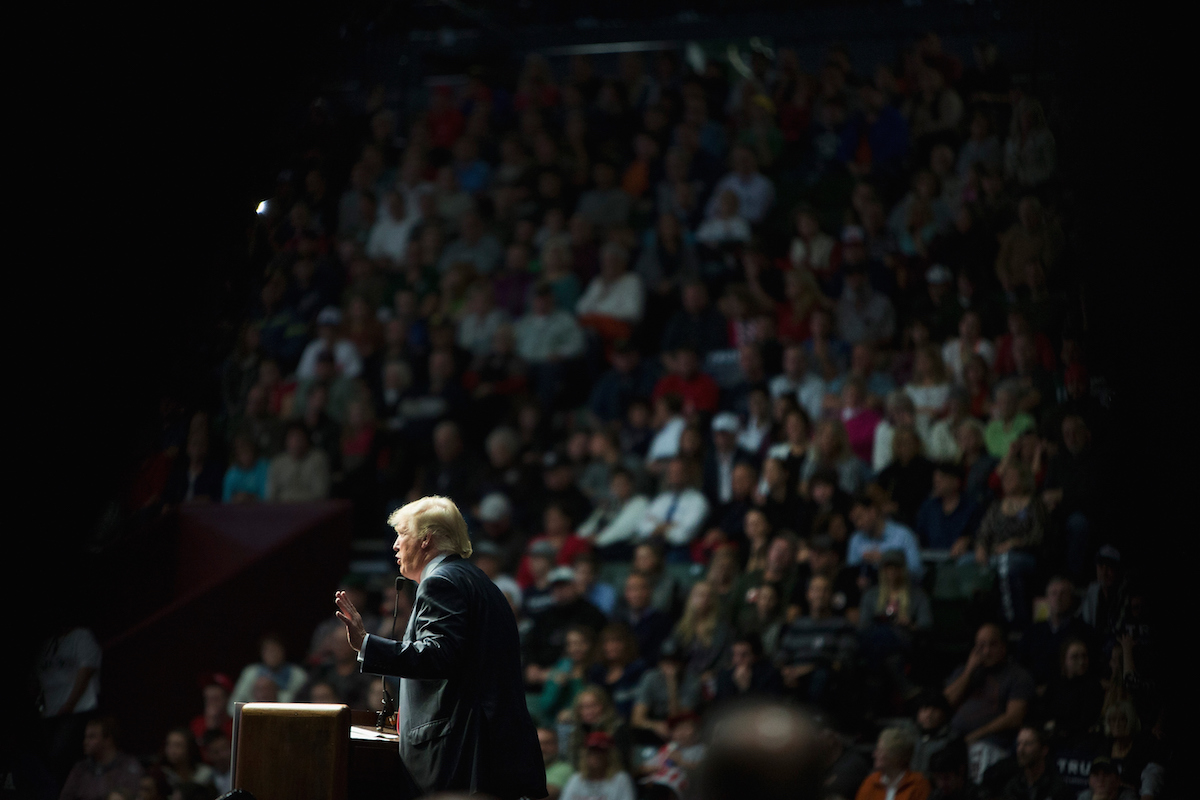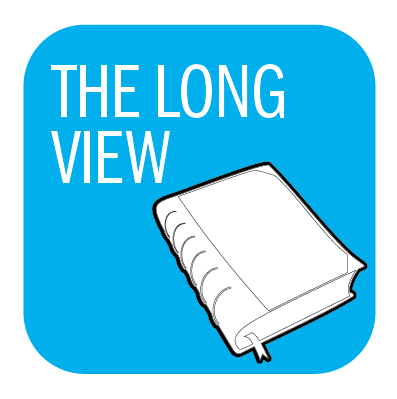
On the front pages of the world’s media, Vladimir Putin and Donald Trump are having a transcontinental romance. Putin calls Trump “an outstanding and talented personality,” “the absolute leader in the presidential race.” Never one to turn away a compliment, Trump welcomes Putin’s approval, defending him by pointing out that no one has ever proven that Putin has ever been behind the murder of reporters in Russia. And though Trump in fact trails every Democrat in trial-heat polls, they seem to be looking forward to the chance to deal with one another as the presidents of the world’s two strongest powers.
In many ways, their friendliness makes sense. In fact, these two men are linked by a common historical thread. Its roots go back at least 80 years, well before either one of them were born.
They came into this world, Trump in 1946 and Putin in 1952, in the wake of the victory of the United States and the Soviet Union in the Second World War. To win that war, both the U.S. and the USSR had fostered almost unprecedented levels of civic engagement among their peoples and mobilized extraordinary resources for a common purpose. The Soviet Union under Stalin fought to save the Communist revolution at home, and ultimately to spread it beyond the USSR’s borders as well. The United States under Franklin Roosevelt explicitly fought to spread political liberty and economic justice around the globe. Putin’s father was a sailor, NKVD secret police operative and soldier during the Second World War; Trump’s father, who was already 36 when the war broke out, built housing near booming east coast Navy bases during the conflict, laying the basis for his postwar fortune. By the time their sons Donald and Vladimir were born, however, their nations were at peace, and contesting for world leadership in the Cold War. Both Trump and Putin grew up hearing that their nation was the greatest on earth, the representative of the wave of the future. They grew up in relatively secure worlds, free of economic insecurity or violence. And they grew up in societies that, in very different ways, were organized to serve the common good.
In both the U.S. and the USSR, the next generation’s emergence into adulthood marked a profound cultural change, and eventually led to a profound political one. In the late 1960s Trump’s—and my—generation revolted against our parents’ values of thrift, sacrifice, self-restraint and devotion to the common good, largely as a result of that great betrayal of American ideals, the Vietnam War. By the mid-1970s, young people had transformed American culture and the New Deal tradition of a regulated economy was moribund. Ronald Reagan explicitly repudiated it in 1981, and it has continued to erode ever since. What happened in the Soviet Union was initially less visible but ultimately even more consequential. By the 1970s Soviet youth had also become infatuated with blue jeans, sex, drugs and rock ‘n’ roll, but they could not openly express themselves in what was still a totalitarian regime. When Leonid Brezhnev and his two successors died in the early 1980s, it became clear that no younger generation shared its elders’ dedication to Communism. The USSR fell apart as soon as Mikhail Gorbachev began to question some its fundamental assumptions in the late 1980s. As in the United States, the postwar generation had rejected the traditions embraced by their parents.
Twenty years after the Cold War ended, Russia and the United States show some remarkable similarities. Today, both are home to politically influential billionaires, high rates of income inequality and large prison populations. On the international scene, both their governments have shown a willingness to make unilateral decisions about military intervention in places like Iraq, Libya, Georgia, Ukraine and Syria. And on a deeper cultural level, I believe, both nations have made a shift away from dedication to the common good and toward support for greater individualism. Trump’s real-estate career reflects these shifts. While his father made his fortune building suburban homes for veterans, financed by government-backed mortgages, he specializes in high-end apartment buildings and casinos.
Putin has already ruled Russia for 16 years, while Trump remains nothing but the leading Republican Presidential candidate. Both, however, reflect the common changes in their two nations. Both promise to make their nations great, as they once were—even as they reject the community-centered values that actually defined their nations’ pasts. And both rely on xenophobia for their appeal, Putin by railing against the West and Trump by supporting the deportation of millions of immigrants and a ban on Muslims entering the U.S.
The mutual praise between Trump and Putin suggests they have somehow realized that they are kindred spirits. Putin, despite Russia’s economic woes, seems secure for the foreseeable future. Trump’s chances at the White House still seem pretty slim, although the chance of him winning the Republican nomination has become quite real. Under Putin, Russia has transformed itself from a totalitarian state dedicated, in theory at least, to economic justice for all, into a free-market paradise dedicated to the wealth and power of the very few. Trump owes his career to a parallel transformation of the United States. In the unlikely event of his election as President, the similarities between his story and Putin’s could continue—and his values would, for the time being, become ours.

Historians explain how the past informs the present
David Kaiser, a historian, has taught at Harvard, Carnegie Mellon, Williams College, and the Naval War College. He is the author of seven books, including, most recently, No End Save Victory: How FDR Led the Nation into War. He lives in Watertown, Mass.
More Must-Reads from TIME
- Donald Trump Is TIME's 2024 Person of the Year
- Why We Chose Trump as Person of the Year
- Is Intermittent Fasting Good or Bad for You?
- The 100 Must-Read Books of 2024
- The 20 Best Christmas TV Episodes
- Column: If Optimism Feels Ridiculous Now, Try Hope
- The Future of Climate Action Is Trade Policy
- Merle Bombardieri Is Helping People Make the Baby Decision
Contact us at letters@time.com